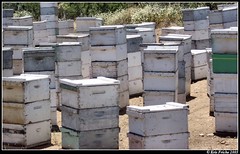All day, every day, people tell me "Isn't there a huge shortage of bees?" or ask me "you know there is supposed to be a big bee shortage?" or otherwise bring up the subject as if I, a professional bee handler, have somehow managed to remain oblivious and have just been waiting around for someone to repeat to me what they overheard on Fox while flipping through channels the night before. So I'm assuming you have heard about it as well: Honeybee Colony Collapse Disorder (CCD).
If you've heard about it at all, what you have probably heard is "some U.S. honeybee hives have lost 90% of their bees to Colony Collapse Disorder." When researching the subject the other day this was practically the only statistic I could find in media. As I pointed out yesterday, "some US hives," have also lost "90% of their bees" due to bears, vandalism, and freak automobile accidents. And more seriously, "some US hives" have certainly lost 90% of their bees to varroa & trachael mites, wax moths, or the Small Hive Beetle (I have some pictures of the destruction these pests have wrought on some local colonies, it is not pretty).
Yesterday I was researching the subject in search of material for the press releases. I called several commercial beekeepers and entomologists who specialize in honeybees, as well as trawling the open sources of the internet. I found the most concise and dependably accurate source to be a Congressional Research Service report thats only a month old.
The Bee shortage everyone is talking about turns out is actually a loss of 38% of hives on average over winter as opposed to the normal average of 16%. Only a quarter of surveyed beekeepers reported symptoms of CCD, though these beekeepers lost an average of 45% of their hives.
Basically, no, 90% of the bees are not gone. Yes, there is an unknown ailment effecting bees and the beekeeping industry is concerned. Its a matter of lost profits and increased costs though, not of the pending extinction of bees. But what IS CCD really? I find its symptoms to be rather strange. Basically, the bees just disappear. There is no corresponding evidence of dead bees. Affected hives are found to still be stocked with honey, and have a healthy queen who is still laying eggs (and a few recently hatched bees are still around) -- but 95% of the bees from that hive are simply not to be found!! Its a bit Bermuda-triangle esque if you ask me.
But what IS CCD really? I find its symptoms to be rather strange. Basically, the bees just disappear. There is no corresponding evidence of dead bees. Affected hives are found to still be stocked with honey, and have a healthy queen who is still laying eggs (and a few recently hatched bees are still around) -- but 95% of the bees from that hive are simply not to be found!! Its a bit Bermuda-triangle esque if you ask me.
The hive basically appears healthy except for the fact that for some reason all the worker bees have left. Wax Moths which usually are quick to invade any weak colony avoid the colonies completely for a few weeks after they've been thus abandoned. If one takes the hive box and places it on top of another healthy hive (hives usually consist of stacked boxes ("supers"), see picture to the right), the healthy hive dies. These facts would make you think there is something toxic about the hive, but I don't believe anything has been detected yet.
Leading theories for cause are either a new or newly more virulent bee disease, or pesticides. Reports on "OrganicConsumers.org" report that from over a thousand organic beekeepers surveyed, not one reported CCD symptoms -- this might mean the cause is somehow linked to either pesticides or the rigours of commercial bee life (which often include a lot of being shipped around in flatbed trucks and other stressful activities), but I'm rather distrustful of information from pro-organic sources -- they're often way too enthusiastic to proclaim "organic" is the answer to everything. Anyway, also there are no reports of Colony Collapse in feral colonies ... not that anyone necessarily would report that though.
Also, some media sources have apparently mentioned that "some people" think cell phone tours may be causing this. This is not a theory which is being seriously considered by any of the experts I've talked to or any of the professional reports I've read. This is just another technology-hating-hippie-theory. (=
In other news, at least in Southern California, the extremely low levels of rain we have gotten this year is certainly having a greater effect on the number of bees in the area than CCD is.
Wednesday, July 25, 2007
Colony Collapse Disorder
Subscribe to:
Post Comments (Atom)

No comments:
Post a Comment